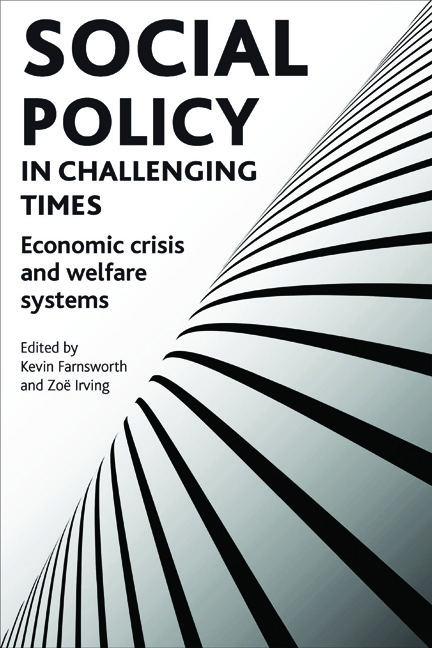Book contents
- Frontmatter
- Contents
- List of figures and tables
- Notes on contributors
- Acknowledgements
- one Varieties of crisis
- two The economic crisis and paradigm change
- three From financial crisis to fiscal crisis
- four Credit crunch, inequality and social policy
- five Global social policy responses to the economic crisis
- six Poverty, the crisis and social policy responses developing countries in developing countries
- seven South Korea after the 1997 economic crisis: a ‘paradigm shift’?
- eight China's response to crisis: what role for social policy?
- nine Tiptoeing through crisis? Re-evaluating the German social model in light of the global recession
- ten Ireland and the impact of the economic crisis: upholding the dominant policy paradigm
- eleven Waving not drowning: Iceland, kreppan and alternative social policy futures
- twelve Experiences from two financial crises in the Nordic welfare states: 1990-93 and 2008-10 compared
- thirteen Social policy and the recent economic crisis in Canada and the United States
- fourteen From economic crisis to a new age of austerity: the UK
- fifteen Responding to the challenges: some concluding remarks on welfare futures in changed circumstances
- Bibliography
- Index
four - Credit crunch, inequality and social policy
Published online by Cambridge University Press: 07 September 2022
- Frontmatter
- Contents
- List of figures and tables
- Notes on contributors
- Acknowledgements
- one Varieties of crisis
- two The economic crisis and paradigm change
- three From financial crisis to fiscal crisis
- four Credit crunch, inequality and social policy
- five Global social policy responses to the economic crisis
- six Poverty, the crisis and social policy responses developing countries in developing countries
- seven South Korea after the 1997 economic crisis: a ‘paradigm shift’?
- eight China's response to crisis: what role for social policy?
- nine Tiptoeing through crisis? Re-evaluating the German social model in light of the global recession
- ten Ireland and the impact of the economic crisis: upholding the dominant policy paradigm
- eleven Waving not drowning: Iceland, kreppan and alternative social policy futures
- twelve Experiences from two financial crises in the Nordic welfare states: 1990-93 and 2008-10 compared
- thirteen Social policy and the recent economic crisis in Canada and the United States
- fourteen From economic crisis to a new age of austerity: the UK
- fifteen Responding to the challenges: some concluding remarks on welfare futures in changed circumstances
- Bibliography
- Index
Summary
Half a century ago, Richard Titmuss showed how ‘the changing concentrations of economic and financial power’ in The Irresponsible Society were impeding the creation of a fairer, more equal society (Titmuss, 1959, in Alcock et al, 2001, p 141). The credit crunch crisis that broke in 2007 and its repercussions make his reflections particularly relevant.
In its more ambitious moments, social policy engages with broader issues about the nature of society and the quantity and quality of life for all its members, even exploring this on a comparative and global scale. But often we fail to avoid ‘the professional ideology of social pathologists’ that C. Wright Mills criticised (Mills, 1943, developed in 1959b, chap. 4) and lapse into a context-stripped approach. This chapter identifies some key social policy issues that we need to address in the irresponsible societies of today. The change from individual to plural ‘societies’ is needed because the credit crunch crossed national frontiers with ease. With its immediate causes linked to problems of housing poverty in the United States (US), its longer-term manufacture can be found in growing concentrations of power and inequality that promoted and enabled financial market deregulation in and across many societies with continuing repercussions.
Social costs
The United Kingdom (UK) ‘output loss’ of recent ‘banking pollution’, to use the words of the Bank of England's executive director of financial stability, is likely to be ‘between one and five times annual GDP [Gross Domestic Product]’, that is, ‘between £1.8 trillion and £7.4 trillion’ (Haldane, 2010, p 4). Even this substantial amount probably omits knock-on social costs in increased unemployment, poverty, illness and their indirect costs, as well as the lost opportunities and long-term reduced standards of living that will result.
In his classic study of social costs, Kapp defined them as ‘all direct and indirect losses sustained by third persons or the general public as a result of unrestrained economic activities’ – a particularly apt phrase for the credit crunch. These losses or costs result in ‘a redistribution of income’ (Kapp, 1963, pp 13 and 15). The challenge is to ensure that these redistributed external costs are not left to lie where they fall (Titmuss, 1968, in Alcock et al, 2001, part 3:2), and much of what is regarded as the ‘public burden of redistribution’ is a response to these transferred costs.
- Type
- Chapter
- Information
- Social Policy in Challenging TimesEconomic Crisis and Welfare Systems, pp. 65 - 80Publisher: Bristol University PressPrint publication year: 2011



